Islamic Fundamentalism History
Source(google.com.pk)
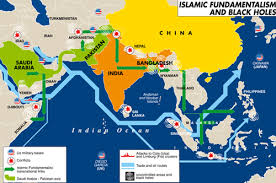
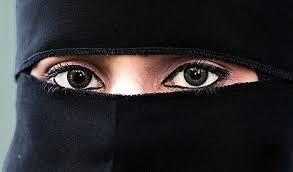


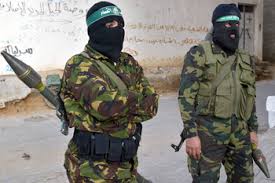

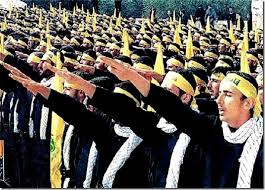


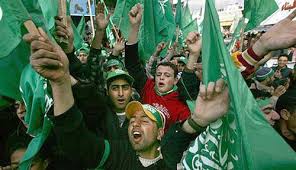
Source(google.com.pk)
Islamic fundamentalism (Arabic: usul, the "fundamentals") is based on Islamic ideology[1] and is a group of religious ideologies seen as advocating a return to the "fundamentals" of Islam: the Quran and the Sunnah. It originated in the Middle East, and was spread with the help of several western powers to further political agendas. [2] Definitions of Islamic fundamentalism vary. It is deemed problematic by those who suggest that Islamic belief requires all Muslims to be fundamentalists,[3] and by others as a term used by outsiders to describe perceived trends within Islam.[4] Exemplary figures of Islamic fundamentalism who are also termed Islamists are Sayyid Qutb, Ruhollah Khomeini, Abul Ala Mawdudi, [5]and Israr Ahmad.[6] The 1979 Islamic Revolution in Iran is seen by some scholars as a political success of Islamic fundamentalism.
Contents [show]
Definitions [edit]
According to Muslim authors the definition of fundamentalism is perceived differently. [7]. According to non Muslim academics like John Esposito, one of the most defining features of Islamic fundamentalism is belief in the "reopening" of the gates of ijtihad.[8] Graham Fuller describes Islamic fundamentalism not as distinct from Islamism but as a subset, "the most conservative element among Islamists." Its "strictest form" includes "Wahhabism, sometimes also referred to as salafiyya. ... For fundamentalists the law is the most essential component of Islam, leading to an overwhelming emphasis uponjurisprudence, usually narrowly conceived."[9] Another American observer, Robert Pelletreau, Jr., assistant secretary of state for Near Eastern affairs, believes it the other way around, Islamism being the subset of Muslims "with political goals ... within" the "broader fundamentalist revival".[10] Still another, Martin Kramer, sees little difference between the two terms: "To all intents and purposes, Islamic fundamentalism and Islamism have become synonyms in contemporary American usage."[11]
American historian Ira Lapidus calls Islamic fundamentalism "an umbrella designation for a very wide variety of movements, some intolerant and exclusivist, some pluralistic; some favourable to science, some anti-scientific; some primarily devotional and some primarily political; some democratic, some authoritarian; some pacific, some violent."[12] He distinguishes between mainstream Islamists and Fundamentalists, saying a fundamentalist is "a political individual" in search of a "more original Islam," while the Islamist is pursuing a political agenda.
Author Olivier Roy distinguishes between fundamentalists (or neo-fundamentalists) and Islamists in describing fundamentalists as more passionate in their opposition to the perceived "corrupting influence of Western culture," avoiding Western dress, "neckties, laughter, the use of Western forms of salutation, handshakes, applause." While Islamists like[13]
Maududi didn't hesitate to attend Hindu ceremonies. Khomeini never proposed the status of dhimmi (protected) for Iranian Christians or Jews, as provided for in the sharia: the Armenians in Iran have remained Iranian citizens, are required to perform military service and to pay the same taxes as Muslims, and have the right to vote (with separate electoral colleges). Similarly, the Afghan Jamaat, in its statutes, has declared it legal in the eyes of Islam to employ non-Muslims as experts.
—Olivier Roy, The Failure of Political Islam
Other distinctions are in
Politics and economics. Islamists often talk of "revolution" and believe "that the society will be Islamized only through social and political action: it is necessary to leave the mosque ..." Fundamentalists are uninterested in revolution, less interested in "modernity or by Western models in politics or economics," and less willing to associate with non-Muslims.[14]
Sharia. While both Islamists and fundamentalists are committed to implementing Sharia law, Islamists "tend to consider it more a project than a corpus."[15]
Issue of women. "Islamists generally tend to favour the education of women and their participation in social and political life: the Islamist woman militates, studies, and has the right to work, but in a chador. Islamist groups include women's associations." While the fundamentalist preaches for women to return to the home, Islamism believes it is sufficient that "the sexes be separated in public." [16]
Controversy [edit]
The term Islamic fundamentalism has been criticized by Bernard Lewis, Khaled Abou El Fadl, Eli Berman, John Esposito, among others. Many have proposed substituting another term, such as "puritanical", "Islamic revivalism" or "activism", and "Radical Islam". The main issue is that the selected terms to misrepresent Islam in an antagonistic way attempt to use words which attempt to denote that they are "basic" attributes. The contradiction arises when the Quran mentions peace, but often advocates war based upon any number of justifications.
Lewis, a leading historian of Islam, believes that although "the use of this term is established and must be accepted"
it remains unfortunate and can be misleading. "Fundamentalist" is a Christian term. It seems to have come into use in the early years of last century, and denotes certain Protestant churches and organizations, more particularly those that maintain the literal divine origin and inerrancy of the Bible. In this they oppose the liberal and modernist theologians, who tend to a more critical, historical view of Scripture. Among Muslim theologians there is as yet no such liberal or modernist approach to the Qur'an, and all Muslims, in their attitude to the text of the Qur'an, are in principle at least fundamentalists. Where the so-called Muslim fundamentalists differ from other Muslims and indeed from Christian fundamentalists is in their scholasticism and their legalism. They base themselves not only on the Qur'an, but also on the Traditions of the Prophet, and on the corpus of transmitted theological and legal learning.[17]
John Esposito has attacked the term for its association "with political activism, extremism, fanaticism, terrorism, and anti-Americanism," saying "I prefer to speak of Islamic revivalism and Islamic activism."[18]
Khaled Abou El Fadl of UCLA, a critic of those called Islamic Fundamentalists, also finds fault with the term because
"many liberal, progressive, or moderate Muslims would describe themselves as usulis, or fundamentalist, without thinking that this carries a negative connotation. In the Islamic context, it makes much more sense to describe the fanatical reductionism and narrow-minded literalism of some groups as puritanical (a term that in the West invokes a particular historical experience ..." [19]
Eli Berman argues that "Radical Islam" is a better term for many post-1920s movements starting with the Muslim Brotherhood, because these movements are seen to practice "unprecedented extremism", thus not qualifying as return to historic fundamentals.[20]
In contrast, American author Anthony J. Dennis accepts the widespread usage and relevance of the term and calls Islamic fundamentalism "more than a religion today, it is a worldwide revolutionary movement." He notes the intertwining of social, religious and political goals found within the movement and states that Islamic fundamentalism "deserves to be seriously studied and debated from a secular perspective as a revolutionary ideology."[21]
At least two Muslim academics, Syrian philosopher Sadiq Jalal al-Azm and Egyptian philosopher Hassan Hanafi, have defended the use of the phrase. Surveying the doctrines of the new Islamic movements, Al-Azm found them to consist of "an immediate return to Islamic ‘basics' and ‘fundamentals.' .... It seems to me quite reasonable that calling these Islamic movements ‘Fundamentalist' (and in the strong sense of the term) is adequate, accurate, and correct."[22]
Hassan Hanafi reached the same conclusion: "It is difficult to find a more appropriate term than the one recently used in the West, 'fundamentalism,' to cover the meaning of what we name Islamic awakening or revival."[23]
Study [edit]
In 1988, the University of Chicago, backed by the American Academy of Arts and Sciences, launched The Fundamentalism Project, devoted to researching fundamentalism in the worlds major religions, Christianity, Islam, Judaism, Hinduism, Buddhism andConfucianism. It defined fundamentalism as "approach, or set of strategies, by which beleaguered believers attempt to preserve their distinctive identity as a people or group ... by a selective retrieval of doctrines, beliefs, and practices from a sacred past."[24]
Origins [edit]
The modern Islamic fundamentalist movements have their origins in the late 19th century.[25] The Wahhabi movement, an Arabian fundamentalist movement that began in the 18th century, gained traction and spread during the 19th and 20th centuries.[26] During theCold War following World War II, some NATO governments, particularly those of the United States and the United Kingdom, launched covert and overt campaigns to encourage and strengthen fundamentalist groups in the Middle East and southern Asia. These groups were seen as a hedge against potential expansion by the atheistic Soviet Union, and as a means to prevent the growth of nationalistic movements that were not necessarily favorable toward the interests of the Western nations.[27] By 1970s the Islamists had become important allies in supporting governments, such as Egypt, which were friendly to U.S. interests. By the late 1970s, however, some fundamentalist groups had become militaristic leading to threats and changes to existing regimes. The overthrow of the Shah in Iran and rise of the Ayatollah Khomeini was one of the most significant signs of this shift.[28] Subsequently fundamentalist forces in Algeriacaused a civil war, caused a near-civil war in Egypt, and caused the downfall of the Soviet occupation in Afghanistan.[29] In many cases the military wings of these groups were supplied with money and arms by the U.S. and U.K.
Interpretation of texts [edit]
Islamic fundamentalists, or at least "reformist" fundamentalists, believe that Islam is based on the Qur'an, Hadith and Sunnah and "criticize the tradition, the commentaries, popular religious practices (maraboutism, the cult of saints), deviations, and superstitions. They aim to return to the founding texts."[citation needed] Examples of individuals who adhere to this tendency are the 18th-century Shah Waliullah in India and Muhammad ibn Abd-al-Wahhab in the Arabian Peninsula.[30] This view is commonly associated with Salafismtoday.
Social and political goals [edit]
As with adherents of other fundamentalist movements,[31] Islamic fundamentalists hold that the problems of the world stem from secularinfluences.
Some scholars of Islam, such as Bassam Tibi, believe that, contrary to their own message, Islamic fundamentalists are not actually traditionalists. He refers to fatwahs issued by fundamentalists such as "every Muslim who pleads for the suspension of the shari‘a is an apostate and can be killed". The killing of those apostates cannot be prosecuted under Islamic law because this killing is justified” as going beyond, and unsupported by, the Qur'an. Tibi asserts, “The command to slay reasoning Muslims is un-Islamic, an invention of Islamic fundamentalists”.[32][33]
Conflicts with the secular state [edit]
Islamic fundamentalism's push for sharia and an Islamic State has come into conflict with conceptions of the secular, democratic state, such as the internationally supported Universal Declaration of Human Rights. Anthony J. Dennis notes that "Western and Islamic visions of the state, the individual and society are not only divergent, they are often totally at odds."[34] Among human rights[35]disputed by fundamentalist Muslims are:
Freedom from religious police
Equality issues between men and women[36]
Separation of religion and state[37]
Freedom of speech[38]
Freedom of religion.[39][40][41][42][43][44][45]
Islamic fundamentalist states [edit]
This section requires expansion.(November 2010)
The 1979 Islamic Revolution in Iran is seen by Western scholars as a success of Islamic fundamentalism.[46][47][48] Some scholars argue that Saudi Arabia is also largely governed by fundamentalist principles, see Wahhabi movement, [49] but Johannes J.G. Jansendisagrees, arguing that it is more akin to a traditional Muslim state, where a power separation exists between "princes" (umarā) and "scholars" (ulama).[50] In contrast, Jansen argues, Khomeini came to power advocating a system of Islamic government where the highest authority is the hands of the ulamā (see Wilayat al Faqih).[51]
Islamic fundamentalist groups [edit]
This section requires expansion.(October 2010)
Muslim Brotherhood [edit]
The Muslim Brotherhood is a fundamentalist[52] Sunni transnational movement and the largest political opposition organization in many Arab states.[53] The world's oldest and largest Islamic political group,[53] it was founded in 1928, in Egypt by the schoolteacher Hassan al-Banna.
The Brotherhood's stated goal is to instill the Qur'an and sunnah as the "sole reference point for ... ordering the life of the Muslim family, individual, community ... and state".[54] Since its inception in 1928 the movement has officially opposed violent means to achieve its goals,[55][56] with some exceptions such as in the Israeli-Palestinian conflict or to overthrow secular Ba'athist rule in Syria (see Hama massacre). This position has been questioned, particularly by the Egyptian government, which accused the group of a campaign of killings in Egypt after World War II.[57]
The Muslim Brotherhood was banned in Egypt during the Mubarak regime, and members were arrested for their participation in it.[58] As a means of circumventing the ban, supporters run for office as independents.[59] Now they have their own political party called Freedom and Justice Party (Egypt). The Muslim Brotherhood returned to Egypt after the revolution in 2011. Mohammed Mursi has now been elected president on the Muslim Brotherhood ticket.
Hamas [edit]
Hamas (an acronym of Ḥarakat al-Muqāwamat al-Islāmiyyah, meaning "Islamic Resistance Movement") is a fundamentalist IslamistPalestinian organization with a socio-political wing and a military wing, the Izz ad-Din al-Qassam Brigades.[60] Israel, the European Union,[61] Japan,[62] and the United States[63] classify Hamas as a terrorist organization.
Based largely upon the principles of Islamic fundamentalism that were gaining momentum throughout the Arab world in the 1980s, Hamas was founded as an offshoot of the Muslim Brotherhood in 1987, during the First Intifada.[64][65] The Hamas affiliated military wing was responsible for the majority of violence and killings attributed to Hamas and conducted numerous attacks against Israeli civilians and soldiers. Tactics have included rocket attacks and from April 1993, suicide bombings. Hamas violence has been directed at Israel,Egypt, and rivaling Palestinian movements in the West Bank and Gaza [66]
Al-Shabaab [edit]
This section is empty. You can help by adding to it. (February 2013)
Boko Haram [edit]
This section does not cite any references or sources. Please help improve this section byadding citations to reliable sources. Unsourced material may be challenged and removed.(April 2013)
Congregation of the People of Tradition for Proselytism and Jihad[2] (Arabic: جماعة اهل السنة للدعوة والجهاد Jamā'a Ahl al-sunnah li-da'wa wa al-jihād), better known by its Hausa name Boko Haram (pronounced [bōːkòː hàrâm], "Western education is sinful"),[3] is a jihadist militant organisation based in the northeast of Nigeria.[4] It is an Islamist movement which strongly opposes man-made laws and westernization. Founded by Mohammed Yusuf in 2001,[5] the organisation seeks to establish sharia law in the country.[6][7] The group is also known for attacking Christians and bombing Mosques and churches.[8][9]
The movement is divided into three factions. In 2011, Boko Haram was responsible for at least 450 killings in Nigeria.[6] It was also reported that they had been responsible for over 620 deaths over the first 6 months of 2012.[10] Since its founding in 2001, the jihadists have been responsible for between 3,000 to 10,000 deaths.[11][12]
The group became known internationally following sectarian violence in Nigeria in July 2009, which left over 1000 people dead.[13] They do not have a clear structure or evident chain of command.[14] Moreover, it is still a matter of debate whether Boko Haram has links to terror outfits outside Nigeria and its fighters have frequently clashed with Nigeria's central government.[6] A US commander stated that Boko Haram is likely linked to Al-Qaeda in the Islamic Maghreb (AQIM),[15][16] although professor Paul Lubeck points out that no evidence is presented for any claims of material international support.[17]
Ansar Dine [edit]
This section is empty. You can help by adding to it. (February 2013)
Ansar al-Sharia [edit]
This section is empty. You can help by adding to it. (February 2013)
Human rights controversy [edit]
Further information: Sharia#Contemporary issues
Fundamentalist Islamic states and movements have been criticized for their human rights record by international organizations. The acceptance of international law on human rights has been somewhat limited even in Muslim countries that are not seen as fundamentalist. Ann Elizabeth Mayer writes that states with a predominantly Muslim population, even when they adopt laws along European lines, are influenced by Islamic rules and precepts of sharia, which cause conflict with international law on human rights. According to Mayer, features found in conflict include severe deficiencies in criminal procedure, harsh criminal penalties causing great suffering, discrimination against women and non-Muslims, and prohibition against abandoning the Islam religion. In 1990, under Saudi leadership, the Organisation of Islamic Cooperation, a group representing all Muslim majority nations, adopted the Cairo Declaration on Human Rights in Islam, which substantially diverges from the 1948 Universal Declaration of Human Rights (UDHR). The Cairo declaration lacks provisions for democratic principles, protection for religious freedom, freedom of association and freedom of the press, as well as equality in rights and equal protection under the law. Further it stipulates that "all the rights and freedoms stipulated in this Declaration are subject to the Islamic shari'a".[67]
The Cairo declaration followed years of limited acceptance of the Universal declaration by predominantly Muslim states. As an example, in 1984, Iran's UN representative, Said Raja'i Khorasani, said the following amid allegations of human rights violations, "[Iran] recognized no authority [...] apart from Islamic law.... Conventions, declarations and resolutions or decisions of international organizations, which were contrary to Islam, had no validity in the Islamic Republic of Iran.... The Universal Declaration of Human Rights, which represented secular understanding of the Judaeo-Christian tradition, could not be implemented by Muslims and did not accord with the system of values recognized by the Islamic Republic of Iran; this country would therefore not hesitate to violate its provisions."[67] These departures, both theoretical and practical, have resulted in a multitude of practices and cases criticized by international human rights groups. See human rights in the Islamic Republic of Iran, human rights in Saudi Arabia, and Taliban treatment of women for specific examples.
Pictures Photos Pics 2013
Pictures Photos Pics 2013
Pictures Photos Pics 2013
Pictures Photos Pics 2013
Pictures Photos Pics 2013
Pictures Photos Pics 2013
Pictures Photos Pics 2013
Pictures Photos Pics 2013
Pictures Photos Pics 2013
Pictures Photos Pics 2013
Pictures Photos Pics 2013
No comments:
Post a Comment